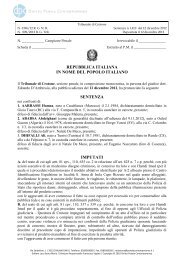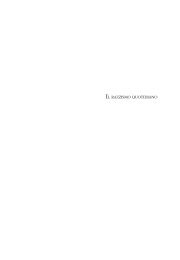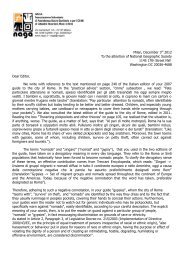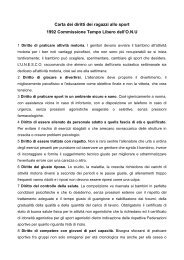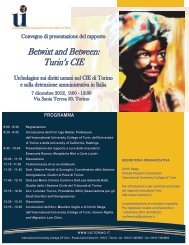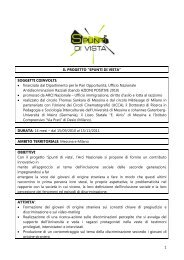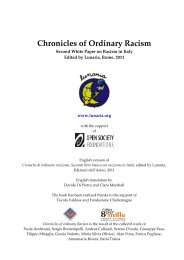Chronicles of ordinary racism 2011 - Cronache di ordinario razzismo
Chronicles of ordinary racism 2011 - Cronache di ordinario razzismo
Chronicles of ordinary racism 2011 - Cronache di ordinario razzismo
- No tags were found...
Create successful ePaper yourself
Turn your PDF publications into a flip-book with our unique Google optimized e-Paper software.
3. Law 94/2009<br />
The following year a new law in the same field, n. 94/2009, is enforced. In spite <strong>of</strong><br />
the usual tendency towards generalization, it touches on many aspects <strong>of</strong> the legal<br />
status <strong>of</strong> immigrants. Alongside various instances <strong>of</strong> restyling and adjusting, mainly<br />
concerning amendments introduced the previous year, the most important rulings can<br />
be summarized as follows: 176<br />
a) Extension <strong>of</strong> the time necessary for the foreign or stateless spouse <strong>of</strong> an Italian citizen<br />
to acquire Italian citizenship subsequent to the marriage itself. As a result <strong>of</strong> this<br />
amendment, in place <strong>of</strong> the six months previously required, one must now reside in the<br />
country for a period <strong>of</strong> at least two years, or count three years from the date <strong>of</strong> the<br />
wed<strong>di</strong>ng if the foreigner lives abroad (halved if children born to, or adopted by, the<br />
couple are involved), provided that at the moment when citizenship is conferred there<br />
has been no instance <strong>of</strong> <strong>di</strong>scontinuation, annulment or termination <strong>of</strong> the civil effects <strong>of</strong><br />
the marriage, and that the couple is not legally separated.<br />
b) Amendment to art. 116, par. 1 <strong>of</strong> the Civil Code after which a foreigner, in order to<br />
obtain a marriage contract in Italy, must submit a document attesting to the regularity<br />
<strong>of</strong> his or her residence status to the civil authority. This decree, strongly criticized from<br />
the very first for being in contrast with articles 2 and 29 <strong>of</strong> the Constitution as well as<br />
with international legislation (art. 16 Universal Declaration <strong>of</strong> Human Rights and art. 12<br />
<strong>of</strong> the European Convention for the Protection <strong>of</strong> Human Rights and Fundamental<br />
Freedoms), has since been declared constitutionally illegal in ruling 245/<strong>2011</strong>. At the<br />
root <strong>of</strong> this decision lies its incompatibility with articles 2, 29 and 117 <strong>of</strong> the Italian<br />
Constitution in as much as it would impact the exercise <strong>of</strong> basic human rights which,<br />
without room for doubt, include the freedom to enter into a marriage contract, not just<br />
for a foreigner but also for the Italian citizen whom they intend to wed.<br />
c) Establishment <strong>of</strong> the crime <strong>of</strong> illegal entry and residence on Italian territory (art. 10bis<br />
T.U.), signifying a criminal status for the foreign national who enters the country or<br />
chooses to remain there, in contravention <strong>of</strong> the law. As it consequence, it has become a<br />
felony punishable by means <strong>of</strong> a fine ranging from 5.000 to 10.000 euros, prompting<br />
many experts to express strong doubts concerning its effectiveness as a deterrent. On<br />
the contrary this measure strikes one as being patently counterproductive both in<br />
rationally monitoring the migratory phenomenon and in insuring the legitimate safety<br />
requirements <strong>of</strong> each human being, regardless <strong>of</strong> their nationality. Indeed, not counting<br />
the fact that it steers away from several fundamental constitutional principles that<br />
govern criminal issues, 177 its implementation gives rise to interpretative issues:<br />
176 In this case the limited space at our <strong>di</strong>sposal again obliges us to give a very brief summary <strong>of</strong> the main<br />
amendments. A deeper reflection is necessary concerning the rules on registration procedures for the homeless and<br />
urban patrols, namely the “associations <strong>of</strong> non armed citizens” that can be set up by mayors “in order to report local<br />
events that may pose a threat to urban security or identify situations <strong>of</strong> social <strong>di</strong>sadvantage”; This regulation was<br />
censored with ruling n. 226/2010 by the Constitutional Court. Equally worthy <strong>of</strong> note is the law on ‘money transfer’<br />
services that enforces the acquisition and retaining <strong>of</strong> a copy <strong>of</strong> residence papers for non-EU citizen, and states that<br />
persons not in possession <strong>of</strong> such documents must be reported to the relevant authorities.<br />
177 It is common knowledge that, in a democratic state, criminal law must protect the fundamental values <strong>of</strong> orderly<br />
cohabitation amongst human beings and <strong>of</strong> their equality. In other words, considering the complexity <strong>of</strong> immigration<br />
issues, the institution <strong>of</strong> a similar criminal <strong>of</strong>fence runs the serious risk <strong>of</strong> punishing not the active behaviour but<br />
rather the status <strong>of</strong> an in<strong>di</strong>vidual especially in a system scarcely able to guarantee efficient procedures for entering<br />
69




